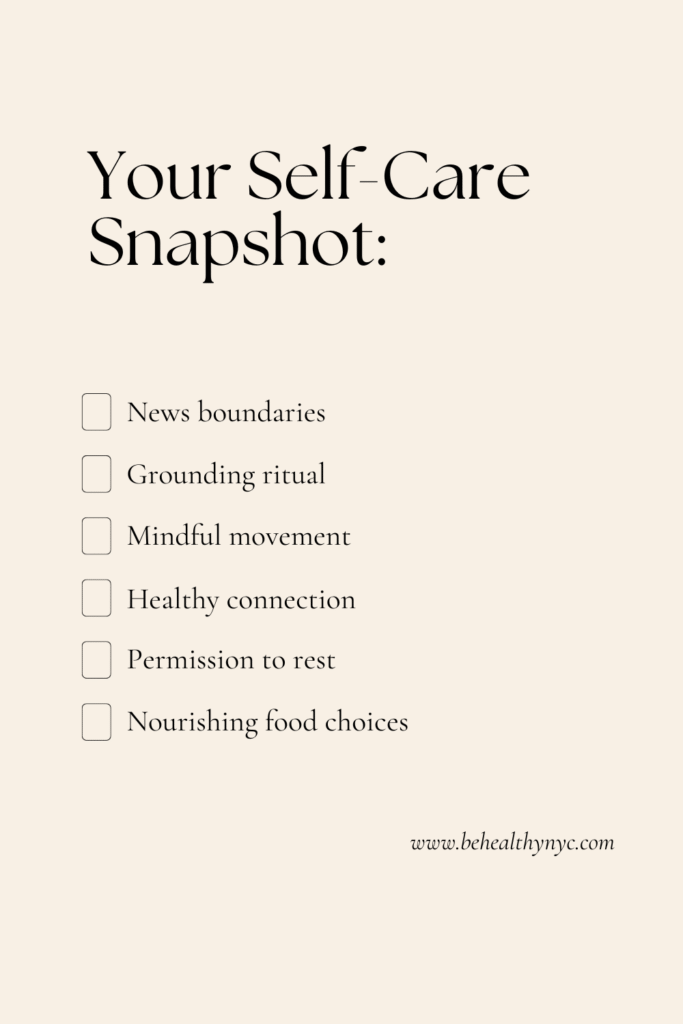Staying Well When the World Feels Unsteady: 6 Wellness Practices for Difficult Times

In moments of political upheaval and social uncertainty, it’s easy to feel like everything is spinning out of control. I certainly have found myself looking for my center many times! The headlines are heavy, conversations are charged, and the emotional weight of simply staying informed can be overwhelming.
It is very easy to slip into depression when we are bombarded with negativity, and it is nearly impossible to avoid the bad news! Every time I open Instagram or You Tube there they are, creeping up, unannounced.
If you’re feeling exhausted, anxious, or mentally drained—know this: you’re not alone. And more importantly, your well-being still matters. This isn’t about ignoring what’s happening. It’s about making space to care for yourself, so you can stay strong, focused, and compassionate in the midst of it all.
1. Take a News Detox—Even Just for a Day
It’s easy to get caught up in reading articles and listening to podcasts about all the difficult events happening in the world. At times, it feels like there’s no end in sight. After months of constant exposure to heavy news—both near and far—I began to notice anxiety creeping in. My thoughts became so negative that I even started having nightmares.
Staying informed matters, but nonstop breaking news can take a serious toll on your mental and emotional well-being.
These days, I avoid social media first thing in the morning and stay off my phone at night. Instead, I wind down with a good comedy or an uplifting book before bed. Spending more time with my dogs has also been incredibly grounding.
Being intentional with media consumption has made a big difference for me—and it might help you too.
Try this:
- Set specific times to check the news (e.g., morning and evening only), and limit the amount of time spent.
- Mute or unfollow accounts that spike stress.
- Replace doomscrolling with a calming ritual (like a warm bath, podcast, or book).
- Steer clear of negative people—this is a rule worth following in every situation!
- Connect with nature and animals if possible.
Protecting your peace isn’t ignorance—it’s self-preservation.
2. Anchor Your Day With One Grounding Ritual
When the world feels chaotic, even the smallest consistent ritual can offer a sense of calm and stability. For years, my anchor was a daily hour-long Vipassana meditation practice. That ritual grounded me deeply.
These days, I may not sit in meditation like I once did, but I continue to carry mindfulness into my daily life. Learning to pay close attention—to my body, to my surroundings—wasn’t easy at first. But over time, with patience and practice, it’s become more natural and more frequent.
My deeper intention now is to create a life that feels peaceful by default—where I don’t need a ritual to feel grounded because presence is part of how I live.
I invite you to explore what grounding means for you. What simple practices bring you back to yourself?
Here are a few ideas:
- A 10-minute stretch in the morning or evening
- Journaling before bed
- Preparing your tea mindfully, without distractions
- Immersing yourself in a favorite hobby
- One of my personal favorites: body scanning—gently noticing how your body feels from head to toe.
Small moments of awareness can create lasting peace. Consistency creates calm.
3. Move Your Body to Process Emotions
Stress and anxiety don’t just live in the mind—they take up residence in the body. As a Yin Yoga teacher, I can confidently say that a deep, intentional stretch in a good Yin class can work wonders.
Movement helps release stored tension, reconnect you to your body, and even clear emotional weight you may have been carrying for years. In my own experience, mindful movement and stretching can offer benefits similar to psychotherapy—but with one key difference: you don’t have to relive past traumas or blame your mother to feel the release!
Try this:
- Walk without your phone
- Put on a playlist and dance freely
- Take the stairs instead of the elevator or escalator
- Do a gentle yoga or breath-focused workout
Even 5 minutes of mindful movement can reset your mood.
4. Connect Without Conflict
I often find myself around combative people. It’s almost as if they sense my peaceful and kind nature and assume that means I’m easily manipulated. Lately, I’ve been shifting my approach—focusing on finding common ground and building our connection from there. I’ve also learned the importance of setting clear boundaries early on. It makes a big difference.
Staying connected with others doesn’t mean you have to agree on everything—or engage in arguments to prove your point. Meaningful relationships are built on mutual respect, not constant debate. Especially during challenging times, human connection is a powerful source of resilience and emotional support. Focus on listening, understanding, and finding common ground. You can protect your peace and still maintain strong, healthy relationships.
Ways to connect:
- Call a friend just to listen
- Set boundaries in tense conversations
- Join a community that nurtures your emotional health
- Find your tribe! Surround yourself with like minded people as often as possible
Connection nourishes us—no arguing required.
5. Give Yourself Permission to Rest
You don’t need to earn your rest by being “on” all the time. Lately, I’ve been giving myself more breaks—and I’m always surprised by how much better I feel after something as simple as washing my face or drinking a glass of water.
I tend to get tunnel vision, diving deep into whatever task is in front of me and losing track of time—often unaware of the mental and physical stress building up.
Now, I’m learning to pause. Just a few moments of rest—closing my eyes, putting my phone down, taking deep breaths, tuning into the sounds around me—can make a world of difference.
Give yourself permission to reset. You’ll be amazed at how refreshed you feel afterward.
Remember:
- Rest is not laziness
- You are allowed to pause
- You are more than what you produce or protest
Rest is revolutionary—especially when the world feels heavy.
6. Nourish Your Body with a Clean Diet
Having a clean, healthy diet not only helps us enjoy optimal health but it can be one of the most powerful tools for supporting your mind and body. Try to include nutrient-dense foods such as leafy greens, plenty of fruits and vegetables, whole grains and legumes, healthy fats, while staying away from processed foods. You will nourish your body and help it reduce inflammation, support hormone balance, and maintain a stable blood sugar —all of which can ease the physical toll of stress.
The benefits don’t stop here, a healthy diet also promotes better digestion and gut health, which plays a key role in mood regulation through the gut-brain connection. Choosing nourishing foods over processed snacks or sugar-filled comfort items can leave you feeling more energized, emotionally balanced, and better equipped to handle life’s challenges.
mindful nourishment:
- Eat slowing and chew each bite well
- Create a calm space for your meals
- Avoid distractions, especially negative or overstimulation
- Eat until you feel almost full, not overly stuffed
Final Thoughts
The political climate may feel uncertain, but your inner world is still within your care.
Take a breath. Take a break. And take care of yourself like someone who deeply matters—because you do.

What’s been helping you stay grounded lately?
Leave a comment below or reach out—I’d love to hear how you’re navigating these times.